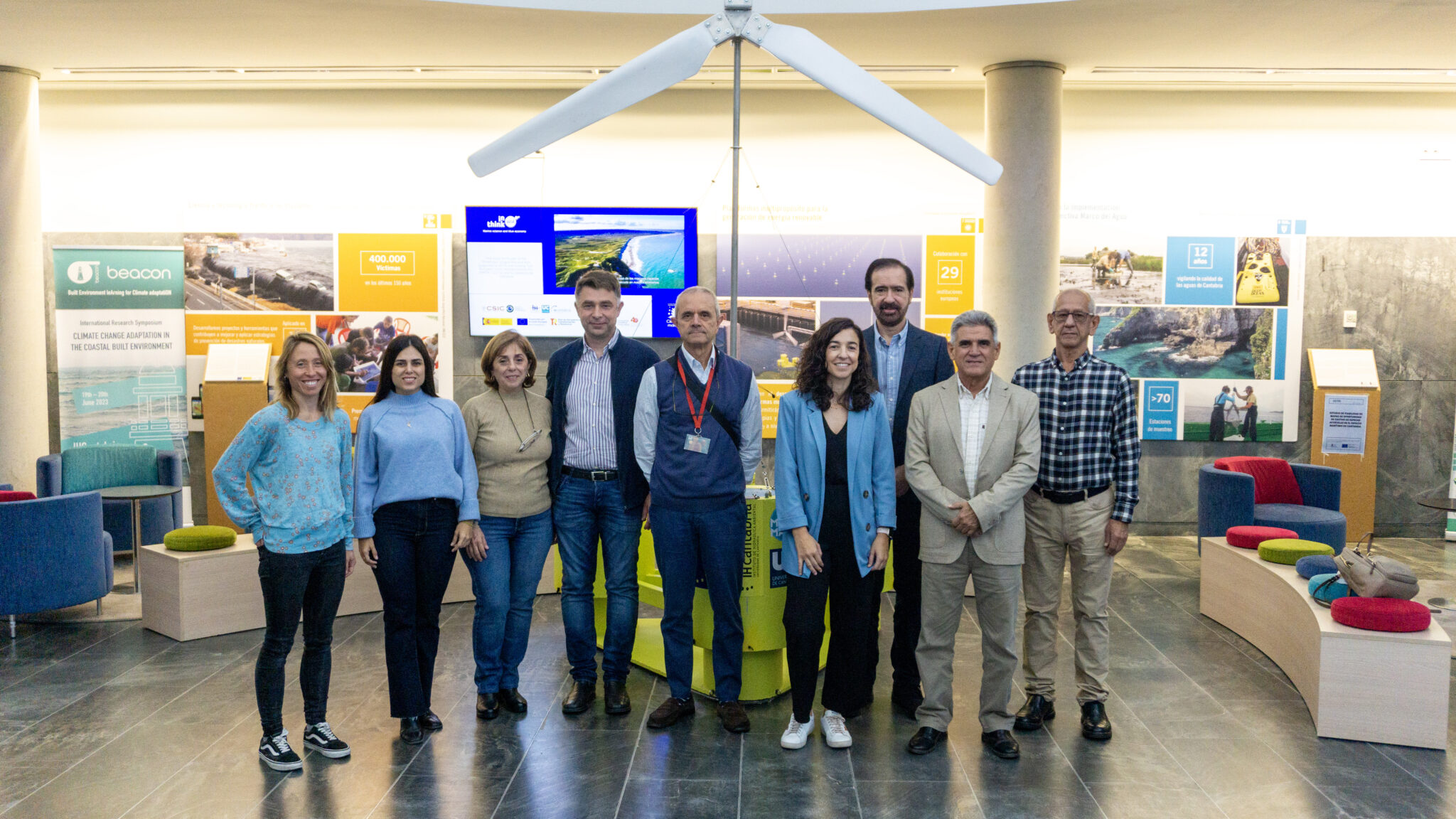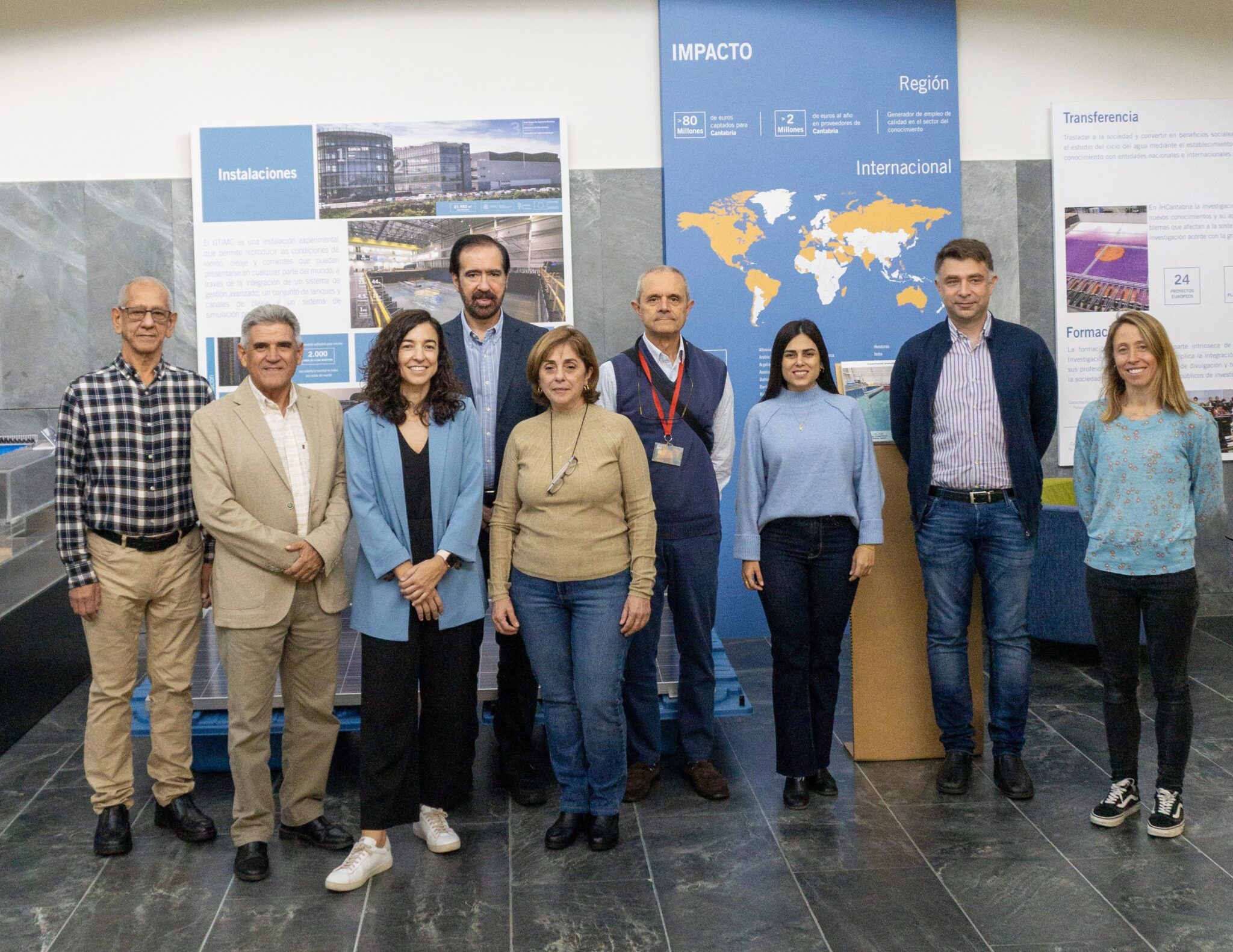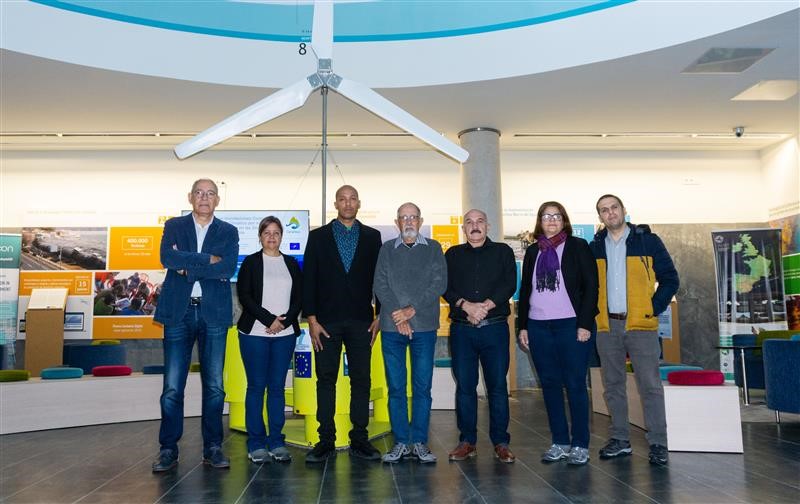IHCantabria receives this week two delegations from Cuba

Group of Cuban professionals who are taking the 3rd training course within the framework of the project ‘Complementary studies for the integral solution to the floods in the Malecón de la Habana’, together with research personnel from IHCantabria.
One of the delegations participated in the 3rd training segment, within the framework of the project ‘Complementary studies for the integral solution to the floods in the Havana Malecon’.
This week, the Institute of Environmental Hydraulics of the University of Cantabria(IHCantabria) received two delegations of professionals from Cuba who are interested in learning about some of the lines of research, training and technology transfer of this institute.
One of the groups is made up of six professionals from the National Center for Protected Areas (CNAP), who are part of the GEF/UNDP ECOVALOR project; while the second group is made up of four professionals who are taking the third training course as part of the project ‘Complementary studies for an integral solution to the floods in the Havana Malecón’.
GEF/UNDP ECOVALOR Project
Based on the objectives, goals and expected results of the GEF/UNDP ECOVALOR project, the CNAP team identified a group of topics of interest to be taken into consideration for a future exchange with IHCantabria. Taking into account the scientific leadership of this institution, both nationally and internationally, the main interest of the ECOVALOR project team has been to learn about the experiences achieved by this research center in the following topics of interest: statistical models applied to environmental problems; construction and analysis of economic-environmental scenarios; spatial modeling tools for ecosystem services; risk analysis of development projects in uncertain environments; methods and techniques for economic valuation of environmental impacts.
3rd training section within the framework of a project related to the Havana Malecon
This week saw the start of the third training section of the project called “Complementary studies for the integral solution to flooding in Havana’s Malecon”, in which four Cuban professionals have participated. The period of execution of this third tranche is from November 4 to 15, 2024. The solutions proposed in this project will have great relevance for the community of Havana, Cuba.
Background of this collaboration
The Fundación Instituto de Hidráulica Ambiental de Cantabria (FIHAC), which IHCantabria represents, together with The Associated Engineering Partnership (Give TAEPwith whom he also participates R5 Marine Solutions), are the entities awarded the project “Complementary studies for the integral solution to flooding in the Havana Malecón”, which consists of carrying out tests in 2D and 3D physical models of the proposed solutions of the Project “Studies for obtaining an integral solution for protection against coastal flooding of the so-called Havana Malecón”, as well as giving short training courses and offering technical support to assist in the designs and decision making. This partnership between IHCantabria and Dar TAEP is called International Consultant. The implementation of this project is financed by non-reimbursable funds provided by the Kuwait Fund for Economic Development (KFED). Kuwait Fund for Arab Economic Development..
The Local Consultant of Cuba is integrated by the National Institute of Hydraulic Resources (INRH), the Western Hydraulic Engineering Services Company (ESIHO) and the Hydraulic Research Center of the Technological University of Havana (CIH-CUJAE). One of the main objectives of this project is to strengthen the capacities of the research team of the Local Consultant of Cuba; in order to achieve this, IHCantabria designed a specific training program that is structured in four training sections, which are executed in the hybrid modality (face-to-face and on-line). The first two training sections were carried out in November 2023 and May 2024.
The complete training program includes from the characterization of maritime climate, through wave propagation, wave interaction with coastal infrastructures, to the composite flooding (marine and hydrological) of sheltered or protected urban areas; for this purpose, both the physical processes that govern these aspects of engineering, as well as the tools with which they are solved and characterized, will be analyzed.
The third training segment will last two weeks, from November 4 to 15, 2024. During this period, the “Workshop on the coupled application of ADCIRC + SWAN models for dynamic simulation studies of hurricanes” will be carried out, applied to the Caribbean region up to the Havana Malecon study area. The establishment of the ADCIRC + SWAN models will be carried out, taking into account in these simulations the known characteristics of hurricanes Wilma 2005 and Irma 2017, which generated extreme flooding in the Havana Malecon.
In charge of the development of the training sections is the person in charge of the Ports and Coastal Infrastructures Group of IHCantabria of IHCantabria, Antonio Tomás Sampedro. In attendance were teaching and research staff from the University of Cantabria. University of Cantabria and IHCantabria, together with a group of Cuban professionals, integrated by: Patricia Ruth de Horta Brito (CIH-CUJAE), Daniela Córdova De Horta (CIH-CUJAE), Luis Fermín Córdova López (Technical Director, CIH-CUJAE) and Juan José Díaz (Project Director, representing ESIHO). Also participating virtually were members of R5 Marine Solutions (André Cardoso y Francisco José Cerda Rojo), representing The Associated Engineering Partnership (Dar TAEP).
The teaching team that will teach the training courses of the third training course is made up of the following members: Marta Ramírez PérezMelisa Menéndez, Antonio Tomás Sampedro y Beatriz Rodríguez Fernández.
The aim of this ambitious project and the training sessions is not only to address current problems, but also to train professionals interested in preserving the coastal environment and in adopting effective preventive measures to face the challenges caused by flooding in Havana’s emblematic Malecón.
The fourth training segment will last three weeks, to be held in April 2025. During this period, an exchange is planned for the follow-up of the 3D physical modeling studies for the study area of the traditional Havana seawall.

From left to right: Juan José Díaz, Luis Fermín Córdova, Beatriz Rodríguez and Patricia de Horta. Back row: Raúl Medina (general manager of IHCantabria), César Vidal, Daniela Córdova, Antonio Tomás and Marta Ramírez.

Groups of six professionals from the National Center for Protected Areas (CNAP), who are part of the GEF/UNDP ECOVALOR project, together with IHCantabria’s Director of Teaching and Training, José A. Juanes (first on the left).

